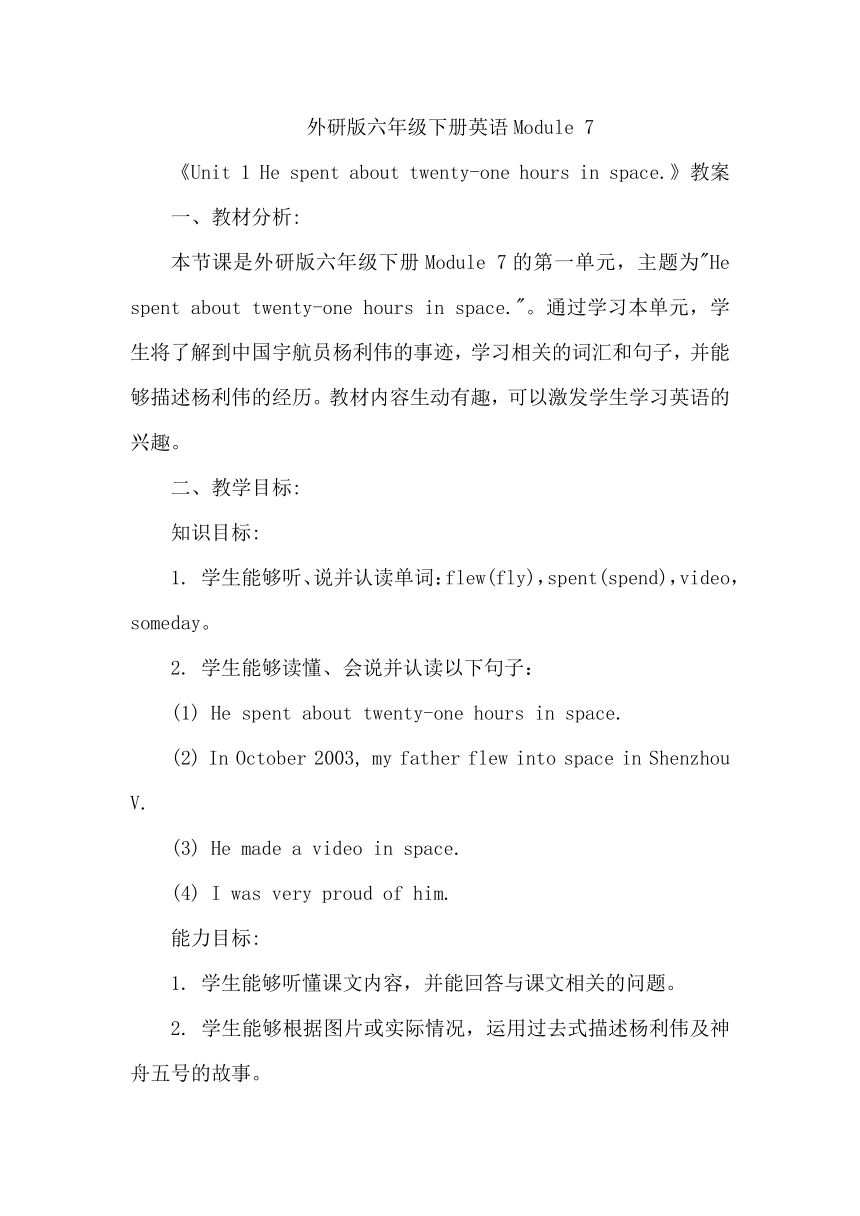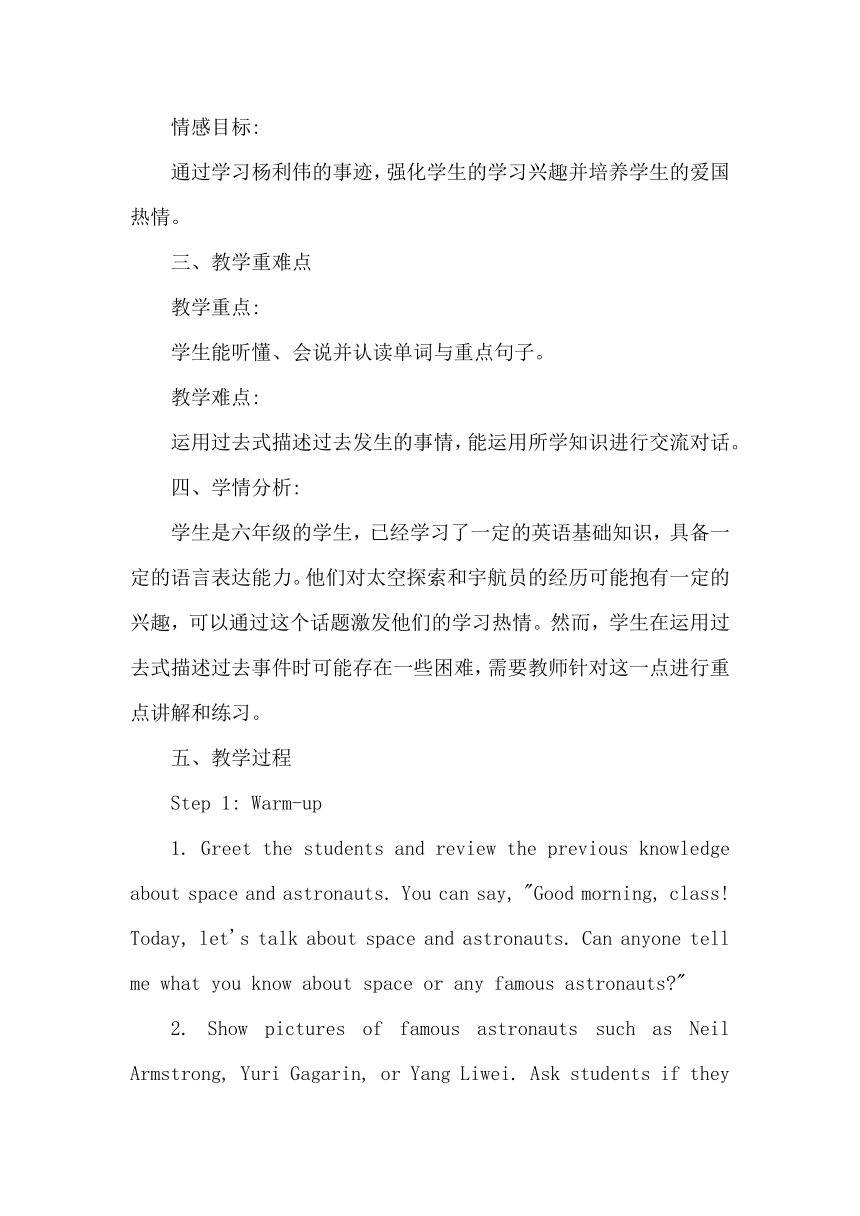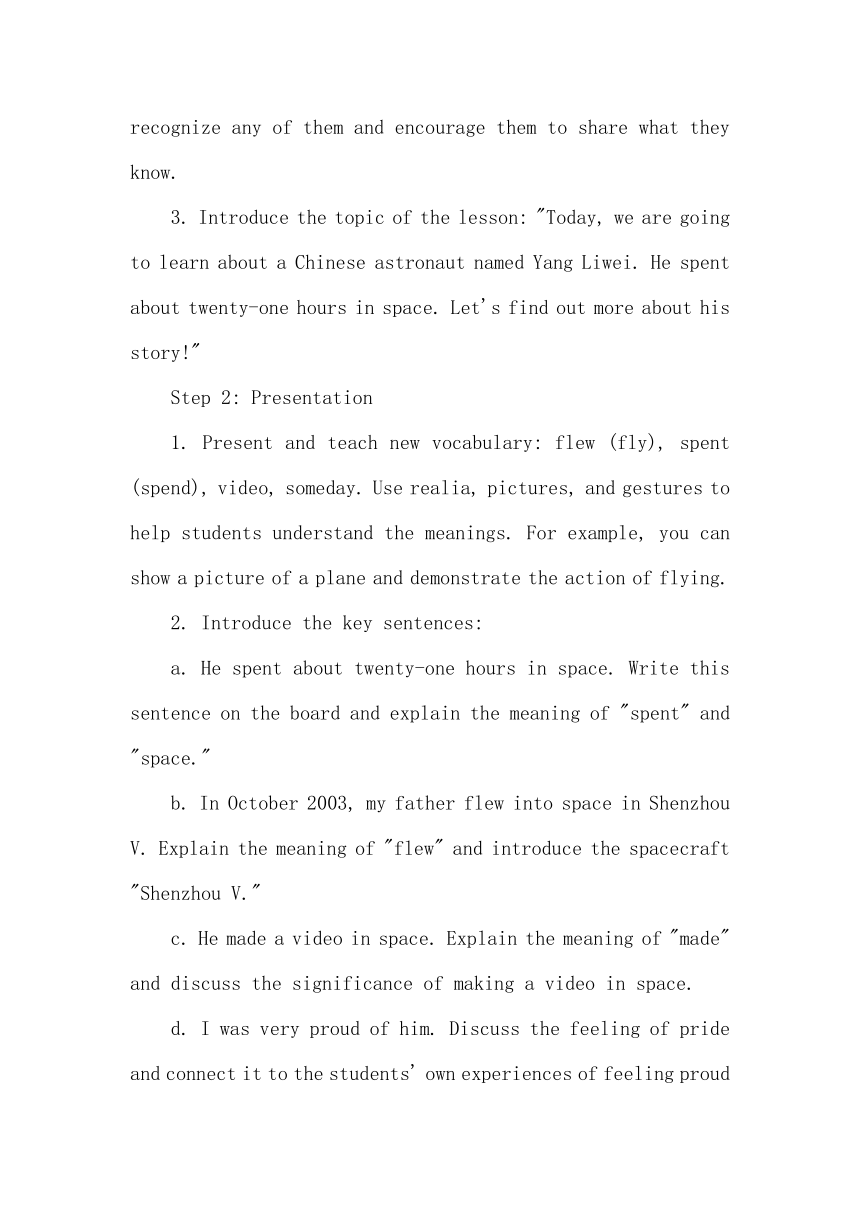Module 7 Unit 1 He spent about twenty-one hours in space.教案
文档属性
| 名称 | Module 7 Unit 1 He spent about twenty-one hours in space.教案 |  | |
| 格式 | docx | ||
| 文件大小 | 14.3KB | ||
| 资源类型 | 教案 | ||
| 版本资源 | 外研版(三年级起点) | ||
| 科目 | 英语 | ||
| 更新时间 | 2024-04-04 15:14:36 | ||
图片预览



文档简介
外研版六年级下册英语Module 7
《Unit 1 He spent about twenty-one hours in space.》教案
一、教材分析:
本节课是外研版六年级下册Module 7的第一单元,主题为"He spent about twenty-one hours in space."。通过学习本单元,学生将了解到中国宇航员杨利伟的事迹,学习相关的词汇和句子,并能够描述杨利伟的经历。教材内容生动有趣,可以激发学生学习英语的兴趣。
二、教学目标:
知识目标:
1. 学生能够听、说并认读单词:flew(fly),spent(spend),video,someday。
2. 学生能够读懂、会说并认读以下句子:
(1) He spent about twenty-one hours in space.
(2) In October 2003, my father flew into space in Shenzhou V.
(3) He made a video in space.
(4) I was very proud of him.
能力目标:
1. 学生能够听懂课文内容,并能回答与课文相关的问题。
2. 学生能够根据图片或实际情况,运用过去式描述杨利伟及神舟五号的故事。
情感目标:
通过学习杨利伟的事迹,强化学生的学习兴趣并培养学生的爱国热情。
三、教学重难点
教学重点:
学生能听懂、会说并认读单词与重点句子。
教学难点:
运用过去式描述过去发生的事情,能运用所学知识进行交流对话。
四、学情分析:
学生是六年级的学生,已经学习了一定的英语基础知识,具备一定的语言表达能力。他们对太空探索和宇航员的经历可能抱有一定的兴趣,可以通过这个话题激发他们的学习热情。然而,学生在运用过去式描述过去事件时可能存在一些困难,需要教师针对这一点进行重点讲解和练习。
五、教学过程
Step 1: Warm-up
1. Greet the students and review the previous knowledge about space and astronauts. You can say, "Good morning, class! Today, let's talk about space and astronauts. Can anyone tell me what you know about space or any famous astronauts "
2. Show pictures of famous astronauts such as Neil Armstrong, Yuri Gagarin, or Yang Liwei. Ask students if they recognize any of them and encourage them to share what they know.
3. Introduce the topic of the lesson: "Today, we are going to learn about a Chinese astronaut named Yang Liwei. He spent about twenty-one hours in space. Let's find out more about his story!"
Step 2: Presentation
1. Present and teach new vocabulary: flew (fly), spent (spend), video, someday. Use realia, pictures, and gestures to help students understand the meanings. For example, you can show a picture of a plane and demonstrate the action of flying.
2. Introduce the key sentences:
a. He spent about twenty-one hours in space. Write this sentence on the board and explain the meaning of "spent" and "space."
b. In October 2003, my father flew into space in Shenzhou V. Explain the meaning of "flew" and introduce the spacecraft "Shenzhou V."
c. He made a video in space. Explain the meaning of "made" and discuss the significance of making a video in space.
d. I was very proud of him. Discuss the feeling of pride and connect it to the students' own experiences of feeling proud of someone.
3. Read the sentences together as a class, emphasizing pronunciation and intonation.
4. Provide explanations and examples to ensure students understand the meaning and usage of each sentence. For example, you can ask students to create their own sentences using the target vocabulary.
Step 3: Practice
1. Play an audio recording of the text about Yang Liwei's space journey. Pause the recording at certain points to check understanding and ask comprehension questions.
2. Ask students to listen carefully and answer comprehension questions related to the text. For example, you can ask, "How long did Yang Liwei spend in space " or "What did he do in space "
3. Divide the class into pairs or small groups. Give each group a set of picture cards related to Yang Liwei's story. The pictures can show different scenes from his space journey, such as getting into the spacecraft, floating in space, or making the video.
4. In groups, students take turns describing the pictures using the target sentences and vocabulary. Encourage them to use the past tense and practice speaking in complete sentences. Monitor the groups and provide assistance as needed.
5. Have some groups present their descriptions to the whole class. This can be done as a role-play, with one student pretending to be Yang Liwei and others asking questions about his experience.
Step 4: Consolidation
1. Ask individual students to share their feelings and thoughts about Yang Liwei's story. For example, you can ask, "How do you feel about Yang Liwei's achievement " or "What do you think about his experience in space "
2. Lead a class discussion about the significance of Yang Liwei's achievement and the importance of space exploration. Encourage students to express their opinions and ask questions. You can ask, "Why do you think it's important for humans to explore space " or "What can we learn from astronauts like Yang Liwei "
Step 5: Wrap-up
1. Review the key vocabulary, phrases, and sentences covered in the lesson. Write the key vocabulary, phrases, and sentences on the board and have students repeat after you. For example, you can write:
flew (fly)
spent (spend)
video
someday
He spent about twenty-one hours in space.
In October 2003, my father flew into space in Shenzhou V.
He made a video in space.
I was very proud of him.
2. Summarize the main points of the lesson and encourage students to continue learning about space and astronauts. You can say, "Today, we learned about Yang Liwei's space journey and practiced using past tense to describe events. Keep exploring and learning about space, and who knows, maybe one day you'll become an astronaut too!"
六、板书设计:
Unit 1 He spent about twenty-one hours in space.
Vocabulary:
flew (fly)
spent (spend)
video
someday
Sentences:
He spent about twenty-one hours in space.
In October 2003, my father flew into space in Shenzhou V.
He made a video in space.
I was very proud of him.
七、教学反思:
在本节课中,通过温故知新和图片呈现的方式引入话题,激发了学生对太空和宇航员的兴趣。在教学过程中,通过实物、图片和示范,引导学生理解并掌握新词汇的意义。通过呈现和讲解重要句子,帮助学生理解并运用目标句子。在练习环节,通过听取录音和描述图片的活动,培养了学生的听力和口语表达能力。同时,通过小组讨论和整体讨论,鼓励学生表达自己的想法和意见,提高了他们的思维能力和表达能力。在课堂结束时,通过复习重点词汇、短语和句子,巩固了学生的学习成果,并鼓励他们继续学习关于太空和宇航员的知识。本节课的教学过程设计合理,充分考虑了学生的兴趣和能力,通过多种形式的师生互动和实际运用,提高了学生的学习效果。为了进一步改进教学,可以根据学生的反馈和表现,适时调整教学方法和内容,确保学生的参与度和学习效果。
《Unit 1 He spent about twenty-one hours in space.》教案
一、教材分析:
本节课是外研版六年级下册Module 7的第一单元,主题为"He spent about twenty-one hours in space."。通过学习本单元,学生将了解到中国宇航员杨利伟的事迹,学习相关的词汇和句子,并能够描述杨利伟的经历。教材内容生动有趣,可以激发学生学习英语的兴趣。
二、教学目标:
知识目标:
1. 学生能够听、说并认读单词:flew(fly),spent(spend),video,someday。
2. 学生能够读懂、会说并认读以下句子:
(1) He spent about twenty-one hours in space.
(2) In October 2003, my father flew into space in Shenzhou V.
(3) He made a video in space.
(4) I was very proud of him.
能力目标:
1. 学生能够听懂课文内容,并能回答与课文相关的问题。
2. 学生能够根据图片或实际情况,运用过去式描述杨利伟及神舟五号的故事。
情感目标:
通过学习杨利伟的事迹,强化学生的学习兴趣并培养学生的爱国热情。
三、教学重难点
教学重点:
学生能听懂、会说并认读单词与重点句子。
教学难点:
运用过去式描述过去发生的事情,能运用所学知识进行交流对话。
四、学情分析:
学生是六年级的学生,已经学习了一定的英语基础知识,具备一定的语言表达能力。他们对太空探索和宇航员的经历可能抱有一定的兴趣,可以通过这个话题激发他们的学习热情。然而,学生在运用过去式描述过去事件时可能存在一些困难,需要教师针对这一点进行重点讲解和练习。
五、教学过程
Step 1: Warm-up
1. Greet the students and review the previous knowledge about space and astronauts. You can say, "Good morning, class! Today, let's talk about space and astronauts. Can anyone tell me what you know about space or any famous astronauts "
2. Show pictures of famous astronauts such as Neil Armstrong, Yuri Gagarin, or Yang Liwei. Ask students if they recognize any of them and encourage them to share what they know.
3. Introduce the topic of the lesson: "Today, we are going to learn about a Chinese astronaut named Yang Liwei. He spent about twenty-one hours in space. Let's find out more about his story!"
Step 2: Presentation
1. Present and teach new vocabulary: flew (fly), spent (spend), video, someday. Use realia, pictures, and gestures to help students understand the meanings. For example, you can show a picture of a plane and demonstrate the action of flying.
2. Introduce the key sentences:
a. He spent about twenty-one hours in space. Write this sentence on the board and explain the meaning of "spent" and "space."
b. In October 2003, my father flew into space in Shenzhou V. Explain the meaning of "flew" and introduce the spacecraft "Shenzhou V."
c. He made a video in space. Explain the meaning of "made" and discuss the significance of making a video in space.
d. I was very proud of him. Discuss the feeling of pride and connect it to the students' own experiences of feeling proud of someone.
3. Read the sentences together as a class, emphasizing pronunciation and intonation.
4. Provide explanations and examples to ensure students understand the meaning and usage of each sentence. For example, you can ask students to create their own sentences using the target vocabulary.
Step 3: Practice
1. Play an audio recording of the text about Yang Liwei's space journey. Pause the recording at certain points to check understanding and ask comprehension questions.
2. Ask students to listen carefully and answer comprehension questions related to the text. For example, you can ask, "How long did Yang Liwei spend in space " or "What did he do in space "
3. Divide the class into pairs or small groups. Give each group a set of picture cards related to Yang Liwei's story. The pictures can show different scenes from his space journey, such as getting into the spacecraft, floating in space, or making the video.
4. In groups, students take turns describing the pictures using the target sentences and vocabulary. Encourage them to use the past tense and practice speaking in complete sentences. Monitor the groups and provide assistance as needed.
5. Have some groups present their descriptions to the whole class. This can be done as a role-play, with one student pretending to be Yang Liwei and others asking questions about his experience.
Step 4: Consolidation
1. Ask individual students to share their feelings and thoughts about Yang Liwei's story. For example, you can ask, "How do you feel about Yang Liwei's achievement " or "What do you think about his experience in space "
2. Lead a class discussion about the significance of Yang Liwei's achievement and the importance of space exploration. Encourage students to express their opinions and ask questions. You can ask, "Why do you think it's important for humans to explore space " or "What can we learn from astronauts like Yang Liwei "
Step 5: Wrap-up
1. Review the key vocabulary, phrases, and sentences covered in the lesson. Write the key vocabulary, phrases, and sentences on the board and have students repeat after you. For example, you can write:
flew (fly)
spent (spend)
video
someday
He spent about twenty-one hours in space.
In October 2003, my father flew into space in Shenzhou V.
He made a video in space.
I was very proud of him.
2. Summarize the main points of the lesson and encourage students to continue learning about space and astronauts. You can say, "Today, we learned about Yang Liwei's space journey and practiced using past tense to describe events. Keep exploring and learning about space, and who knows, maybe one day you'll become an astronaut too!"
六、板书设计:
Unit 1 He spent about twenty-one hours in space.
Vocabulary:
flew (fly)
spent (spend)
video
someday
Sentences:
He spent about twenty-one hours in space.
In October 2003, my father flew into space in Shenzhou V.
He made a video in space.
I was very proud of him.
七、教学反思:
在本节课中,通过温故知新和图片呈现的方式引入话题,激发了学生对太空和宇航员的兴趣。在教学过程中,通过实物、图片和示范,引导学生理解并掌握新词汇的意义。通过呈现和讲解重要句子,帮助学生理解并运用目标句子。在练习环节,通过听取录音和描述图片的活动,培养了学生的听力和口语表达能力。同时,通过小组讨论和整体讨论,鼓励学生表达自己的想法和意见,提高了他们的思维能力和表达能力。在课堂结束时,通过复习重点词汇、短语和句子,巩固了学生的学习成果,并鼓励他们继续学习关于太空和宇航员的知识。本节课的教学过程设计合理,充分考虑了学生的兴趣和能力,通过多种形式的师生互动和实际运用,提高了学生的学习效果。为了进一步改进教学,可以根据学生的反馈和表现,适时调整教学方法和内容,确保学生的参与度和学习效果。
同课章节目录
- Module 1
- Unit 1 I want a hot dog,please.
- Unit 2 What do you want to eat?
- Module 2
- Unit 1 When are you going to eat?
- Unit 2 It will snow in Harbin
- Module 3
- Unit 1 The sun is shining.
- Unit 2 The cows are drinking wate
- Module 4
- Unit 1 The balloons are flying away!
- Unit 2 The apples are falling down the stairs
- Module 5
- Unit 1 He is playing the suona, but the phone ring
- Unit 2 He's riding his bike,but it's starting to r
- Module 6
- Unit 1 It was Daming's birthday yesterday.
- Unit 2 The name of the spaceship is Shenzhou V.
- Module 7
- Unit 1 He spent about twenty-one hours in space.
- Unit 2 She couldn't see or hear .
- Module 8
- Unit 1 Why do you have cups on your heads?
- Unit 2 Why are you wearing a hat?
- Module 9
- Unit 1 Best wishes to you.
- Unit 2 Wishing you happiness every day.
- Module 10
- Unit 1 We are going to different schools.
- Unit 2 What are you going to study?
- Review Module
- Unit 1
- Unit 2
